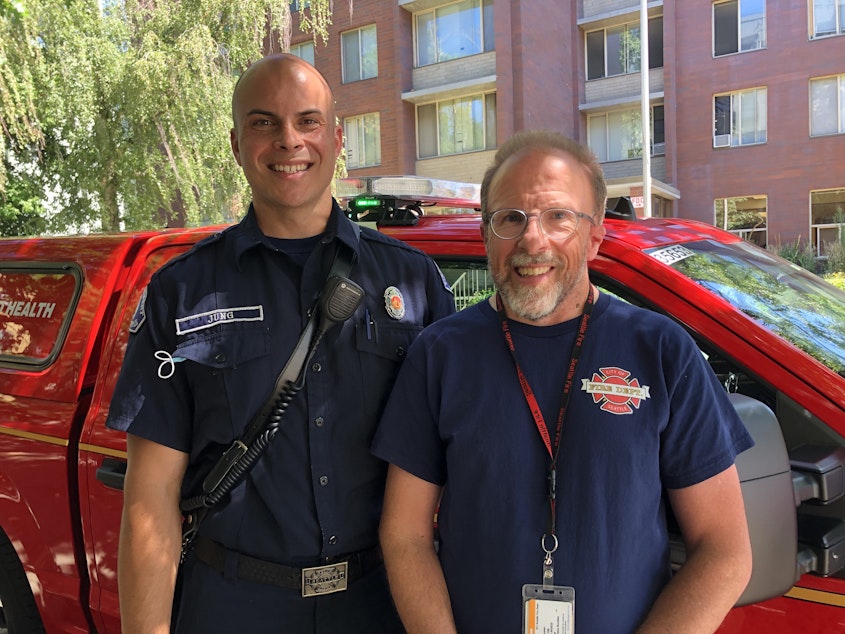Seattle Fire Dept. expands crisis response while city awaits new 911 options

Seattle residents have asked city officials to offer more types of crisis response that don't involve law enforcement. The mayor's office has convened a work group on the issue. Meanwhile, the Seattle Fire Department is expanding its efforts in that direction.
The Seattle Fire Department’s Health One teams were launched in 2019. They pair firefighters with case workers to follow up with people who had contact with the 911 system. And the program is growing – they just added a third unit this year.
Recordings from the Seattle Fire Department provide a sense of how the units are deployed. In most cases, it’s not a 911 dispatcher sending them. Instead other firefighter EMTs are asking their Health One colleagues to follow up.
One says they treated a woman who is looking for somewhere to stay, adding, "I don’t know if that’s something you guys can help us out with.”
Another asks them to check on a man who has "been here on the sidewalk since yesterday, no place to go.”
A third gives a referral for a woman, adding, “I would like her to get seen at the hospital, I think she could be convinced if you are able to spend time and build some rapport.”
Sponsored
Spending some time is something that Health One teams can offer. They can also research each case and see if people are entitled to any benefits or assistance. According to the Seattle Fire Department, most people referred to Health One teams are elderly, without housing, and/or have mental health or substance use disorders.
Firefighter Matthew Jung is a member of a Health One team. He’s having to work overtime on top of his full-time job driving a fire engine, but he says this work fits with the Fire Department’s mission.
“I can’t think of a more clear picture of serving our fellow person than sitting down next to them on a sidewalk and saying, ‘I’m not going anywhere until we fix this problem,'” he said.
And the problems are complex.
On a recent weekday morning, Jung and caseworker Greg Jensen are sent to check on a man in North Seattle who medics say is addicted to alcohol and refusing to get help with open wounds on his legs. Jung and Jensen drive north to a house near Carkeek Park.
Sponsored
“Hopefully we can find him," Jung said. "We’re going to his residence but they’re often out in the community, so we might have to work to track him down a little bit.”
When they pull up at the house, no one answers the door, but a person sitting in the front yard offers them a phone number. Later a caregiver called Jensen and said they asked the man to leave the house because he was drinking. So the search continues.
Still, Jensen says showing up with the Fire Department generates a surprising amount of goodwill.
“They literally and metaphorically open doors that would not be open to case managers just knocking on your door with good intentions,” he explained.
In the wake of 2020’s anti-police protests, members of the public have pressed Seattle officials to launch more types of crisis response that is not affiliated with law enforcement. Opinions are mixed on whether those efforts present safety risks.
Sponsored
Bothell Police Chief Ken Seuberlich said police officers and a mental health professional recently went to a call when a man in crisis was throwing cinder blocks. He said the mental health worker did not feel safe approaching the man until police officers were able to de-escalate and calm the man's behavior.
Ultimately, though, he said the encounter "was a great success."
"The [mental health professional] got to watch the officers de-escalate, and the officers watched the MHP work her magic and get individual transported," he said.
Mike Manzanarez, president of the King County Police Officers Guild, said non-police responses could be helpful to everyone, as long as any safety concerns can be addressed.
“It’s worth a try," he said. "Anything’s worth a try right now with the shortage of staffing that we have across this nation in law enforcement, that no one wants to do this job very much anymore. I think we’ve got to think outside the box.”
Sponsored
Jon Ehrenfeld, who oversees the Health One program at the Seattle Fire Department, says each type of crisis response fills a need, from police to fire to social workers. He does think there’s room for civilians to handle more crisis calls with proper call screening and training.
“I think there’s a lot of exciting possibilities at the 911 level," he said. "For example Austin, Texas, now integrates mental health professionals directly into their 911 dispatch. When you call 911 in Austin, Texas, you now hear, ‘Austin 911. Do you need police, fire, medical or mental health?”
Ehrenfeld is part of a group convened by Mayor Harrell’s office called the Alternative Response Team, that is looking at next steps in these efforts.
And Seattle Police Officers Guild President Mike Solan says “alternative forms of policing” are a topic of his union’s ongoing collective bargaining with the city.




